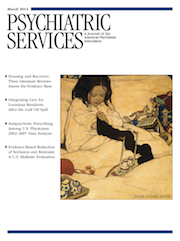Health Care Experiences and Perceived Financial Impact Among Families of Children With an Autism Spectrum Disorder
Abstract
Objective
The authors compared the health care experiences of families raising a child with autism spectrum disorder (ASD), an intellectual disability disorder (IDD), or attention-deficit hyperactivity disorder (ADHD).
Methods
Children with a current diagnosis of ASD (N=3,005), ADHD (N=9,662), or IDD (N=949) were identified in the 2009–2010 National Survey of Children With Special Health Care Needs. Weighted structural equation modeling was used to determine the association between family satisfaction with medical care, timeliness of care, and medical insurance coverage and the impact of the child’s condition on the family’s financial situation.
Results
Families of children diagnosed as having ASD comorbid with either ADHD or IDD or comorbid with both conditions reported the highest levels of dissatisfaction across all health care quality variables and experienced the greatest impact on the family’s financial situation.
Conclusions
The findings underscore the need for comprehensive and accessible health care services for children with ASD, particularly those with comorbid conditions.



